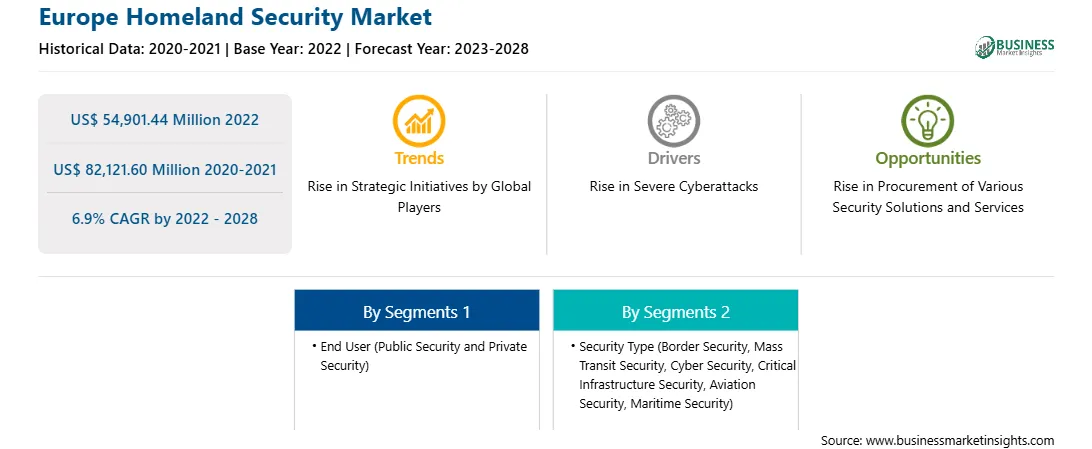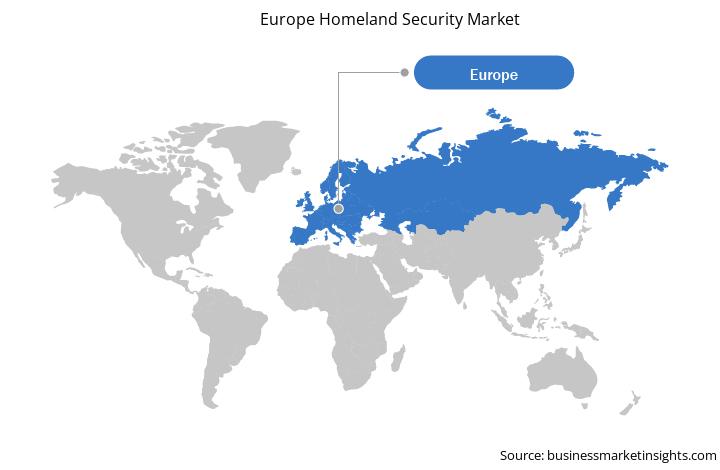Rise in Severe Cyberattacks
Several nations have experienced a rise in cyber-attacks over the years. The adoption of digitalization across all industries and commercial sectors across the region has resulted in organizations adopting cloud storage solutions, which have led to the easy availability of important business documents on the internet. This has influenced the rise in cyber-attacks across the region. Some of the recent cyber-attacks that led to huge losses faced by organization are below:
• In May 2021, Ireland's Health Service Executive (HSE) department faced a ransomware cyber-attack for US$ 20 million. The attack led to the cancellation of all outpatient appointments and the mismanagement of patients across hospitals. The health sector had to temporarily shut down its IT systems to prevent further damage.
The rise in cyberattacks is putting various important documents of private and public enterprises at risk. The loss of such information to illegal hacking groups is imposing severe losses on the enterprises and impacting the nations' economies. Thus, the rise in cyber-attacks across the region is influencing both public and private sectors to invest in the integration of advanced cyber security solutions. These factors are thereby driving the Europe homeland security market.
Market Overview
France, Germany, Italy, the UK, Russia, and rest of Europe are the key contributors to the homeland security market in the Europe. Several European countries experienced a significant rise in security expenses for a country over the past century, which is propelling the adoption of modernized equipment, including advanced coastal surveillance systems, sensor systems, command and control systems, land vehicles, manned and unmanned systems, and surveillance systems. In addition, terrorist attacks on the US and attacks on European countries such as the UK and Spain prompted both sides of the Atlantic to reinvigorate their respective efforts to ensure homeland security and combat terrorism. However, the US and European approaches to these issues differ. The US has embarked on an extensive reorganization of its domestic security and border protection institutions. Moreover, European countries have preferred to work within their existing institutional architectures to combat terrorism and respond to other security challenges and disasters, both natural and man-made. For instance, in July 2021, the French Ministry of the Interior selected four companies to create the administration system for its digital identity scheme—Sopra Steria, Atos, and collaboration between Idemia and Idakto. Sopra Steria was awarded the contract to provide architecture, security, and user experience management services. Atos will oversee developing and maintaining the Digital Identity Management System and the applications that allow French citizens to identify themselves for public services through the France Connect site. The collaboration between Idemia and Idakto will provide software for reading information from electronic identification documents, which will serve as the foundation for digital identity. These include new electronic ID cards, residency permits, and passports. Moreover, in October 2021, Leonardo signed a framework agreement with the German Federal Office of Bundeswehr Equipment, Information Technology, and In-Service Support (BAAINBw) for the supply of up to 107,929 daylight optics for use on both current and new Bundeswehr assault rifles through its subsidiary Leonardo Germany GmbH. Further, in May 2022, the European Union awarded Leonardo a five-year contract to offer cyber-security services to the homeland security agency in charge of large-scale information-technology projects crucial to the bloc's internal security.
Strategic insights for the Europe Homeland Security provides data-driven analysis of the industry landscape, including current trends, key players, and regional nuances. These insights offer actionable recommendations, enabling readers to differentiate themselves from competitors by identifying untapped segments or developing unique value propositions. Leveraging data analytics, these insights help industry players anticipate the market shifts, whether investors, manufacturers, or other stakeholders. A future-oriented perspective is essential, helping stakeholders anticipate market shifts and position themselves for long-term success in this dynamic region. Ultimately, effective strategic insights empower readers to make informed decisions that drive profitability and achieve their business objectives within the market. The geographic scope of the Europe Homeland Security refers to the specific areas in which a business operates and competes. Understanding local distinctions, such as diverse consumer preferences (e.g., demand for specific plug types or battery backup durations), varying economic conditions, and regulatory environments, is crucial for tailoring strategies to specific markets. Businesses can expand their reach by identifying underserved areas or adapting their offerings to meet local demands. A clear market focus allows for more effective resource allocation, targeted marketing campaigns, and better positioning against local competitors, ultimately driving growth in those targeted areas.
Europe Homeland Security Strategic Insights

Europe Homeland Security Report Scope
Report Attribute
Details
Market size in 2022
US$ 54,901.44 Million
Market Size by 2028
US$ 82,121.60 Million
Global CAGR (2022 - 2028)
6.9%
Historical Data
2020-2021
Forecast period
2023-2028
Segments Covered
By End User
By Security Type
Regions and Countries Covered
Europe
Market leaders and key company profiles
Europe Homeland Security Regional Insights

Europe Homeland Security Market Segmentation
The Europe homeland security market is segmented into end user, security type, and country.
Based on end user, the market is bifurcated into public security and private security. The public security segment registered the larger market share in 2022.
Based on security type, the market is segmented into border security, mass transit security, cyber security, critical infrastructure security, aviation security, maritime security, and others. The cyber security segment held the largest market share in 2022.
Based on country, the market is segmented into France, Germany, Italy, UK, Russia, and rest of Europe. Russia dominated the market share in 2022.
Elbit Systems Ltd; IBM Corporation; Lockheed Martin Corporation; Leidos; Thales Group; Teledyne FLIR LLC; Northrop Grumman Corporation; Raytheon Technologies Corporation; Textron Systems; and General Dynamic Information Technology, Inc. are the leading companies operating in the homeland security market in the region.
The Europe Homeland Security Market is valued at US$ 54,901.44 Million in 2022, it is projected to reach US$ 82,121.60 Million by 2028.
As per our report Europe Homeland Security Market, the market size is valued at US$ 54,901.44 Million in 2022, projecting it to reach US$ 82,121.60 Million by 2028. This translates to a CAGR of approximately 6.9% during the forecast period.
The Europe Homeland Security Market report typically cover these key segments-
The historic period, base year, and forecast period can vary slightly depending on the specific market research report. However, for the Europe Homeland Security Market report:
The Europe Homeland Security Market is populated by several key players, each contributing to its growth and innovation. Some of the major players include:
The Europe Homeland Security Market report is valuable for diverse stakeholders, including:
Essentially, anyone involved in or considering involvement in the Europe Homeland Security Market value chain can benefit from the information contained in a comprehensive market report.